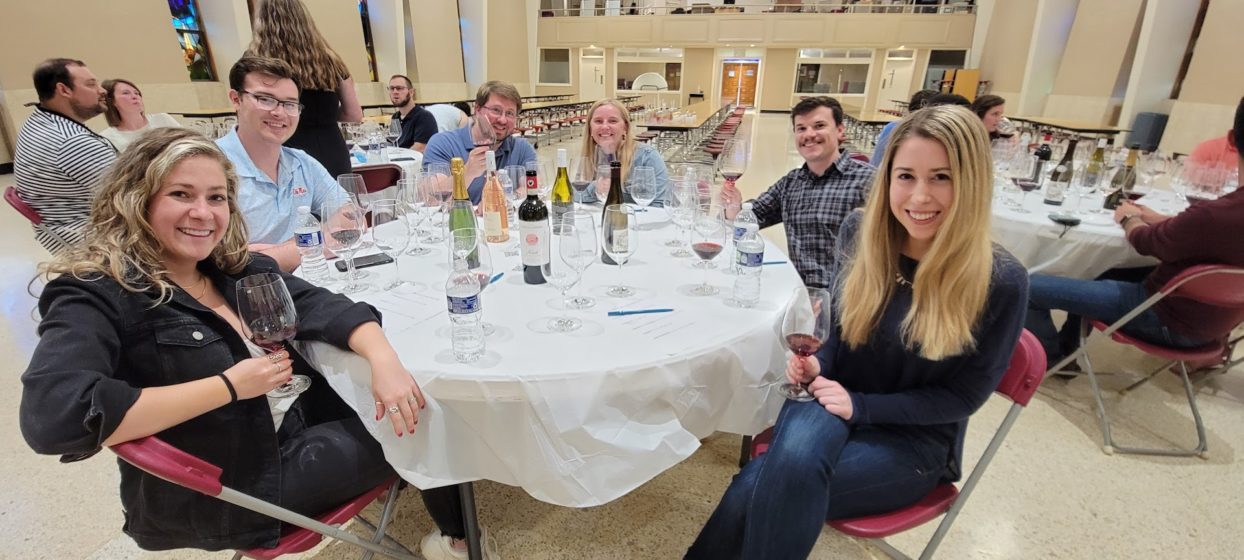Cathedral parish takes part in national initiative to engage young adults in faith
By Emily Booker
What was life like when you were 22? For some, it was graduating college, getting married, and settling down in a career. For others, it was cheap housing with several friends and partying between working minimum-wage jobs. For many, you’re an adult, but you’re still not sure who you are yet. You’re capable of so much, but you’re unsure if you’re ready.
It’s an age of more questions than answers.
As Taylor Swift sings, “We’re happy, free, confused, and lonely at the same time.”
For adults in their 20s these days (younger millennials and older Gen Z), the search for identity and meaning is compounded by a society that values individualism and consumerism over community and authenticity. There is a strong distrust of institutions. More and more were raised without religion being a part of their family, and many who were raised in the Church are leaving with the impression that the Church is not a welcoming place.
How can the Church reach out and provide the love, support, and belonging that this generation needs? How does a young adult seeking authentic connection and meaning find that the answers lie in Christ and His Church?
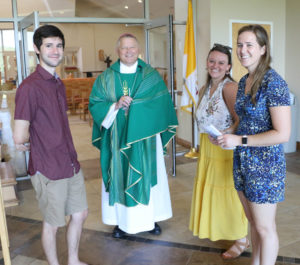
Bishop Richard F. Stika visits with parishioners following a Mass for young adults at St. Albert the Great Church in Knoxville in August.
The Lilly Endowment philanthropic organization established the Young Adult Initiative (YAI) to explore how to get young adults involved in church. The Lilly Endowment granted $19.4 million to the five-year program to help congregations find new ways to engage young adults (defined by the initiative as ages 23-29). The YAI builds off earlier studies researching the decline of religious beliefs among younger generations and current attitudes about identity, purpose, family, values, and faith among young adults. One such study was the Lily Endowment-funded National Study of Youth and Religion based at the University of Notre Dame.
Rather than focusing on why young people leave the Church, the YAI studies why others stay and remain active. It aims to explore how to best provide support for young adults to get active in their communities and then to invite and engage others. Twelve “hubs” were selected to represent different Christian traditions from evangelical to Orthodox. St. Meinrad Seminary in Indiana was selected as the hub to oversee the participating Catholic parishes.
Michal Horace is the director of the St. Meinrad Young Adult Initiative.
“St. Meinrad has always had a charism for youth and young adults,” he said. “[St. Meinrad is] always looking for ways we can better serve youth and young adults and those who minister to them. An opportunity occurred when the Lilly Endowment asked if we would be interested in a special project about engaging young adults. St. Meinrad was very enthusiastic about that and jumped on board immediately and said, ‘Yes, we would love to be a part of that, and that fits in perfectly with our mission and what we’re doing, and so let’s go. Let’s do it.’”
Finding community within a parish
In 2017, St. Meinrad called for applications from Catholic parishes interested in participating in the initiative. Out of 96 applications, the Cathedral of the Most Sacred Heart of Jesus was one of 16 parishes chosen. Thirteen went on to complete the five-year project.
Father David Boettner, rector of the cathedral parish, first heard of the YAI through a St. Meinrad alumni newsletter and immediately was interested.
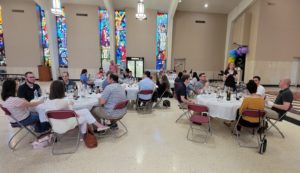
Sacred Heart Parish hosts a wine-tasting evening for young adults. Such events have been made possible through the Young Adult Initiative.
“When I saw that they were doing this program, to really try to come up with some new ideas for young adult ministry, I was thrilled,” he said. “As a priest, we’ve been trying to do young adult ministry for decades, and we’ve not been particularly successful at it. It looked like a very intentional effort to learn from some best practices, form a cohort that can journey together and share their experiences, and be willing to make mistakes and see what works.”
Father Boettner spoke with the cathedral’s director of religious education at the time, Dave Wells, who then took the lead in getting the initiative rolling at the parish. The first task was to form a core team of parishioners who could envision and implement ideas for engaging local young adults as well as participate in YAI gatherings at St. Meinrad twice a year. Because young adulthood covers a broad range of life stages and needs, Sacred Heart’s core team intentionally consisted of young adults representing different demographics: student, professional, married, parent, single, Anglo, Hispanic.
An early part of the YAI involved examining the demographics of the parish and the community of the parish boundary. The National Dialogue was a collaborative effort of the U.S. Conference of Catholic Bishops and youth and young adult ministry organizations to engage the Church in a National Dialogue on Catholic Pastoral Ministry with Youth and Young Adults. As part of this effort, volunteers at Sacred Heart held listening sessions, hoping to reach both affiliated and nonaffiliated adults and hear their thoughts on faith and spiritual needs. Listening was the first step to working toward a parish culture that welcomed young adults and met their needs for identity and community.
The initiative emphasizes that the YAI is an undertaking of the whole parish, not just young adults and ministers. To create a welcoming place, the whole parish must be on board and willing to help.
“Hospitality is critical,” Father Boettner said. “The young adult community has to feel welcome. It’s hard, especially if you’re a young adult by yourself, to go to Mass and sit by yourself, so there needs to be a real intentional effort to greet people at the door and make sure they feel comfortable, to try to connect them to others. The priest or deacon or usher, you know, they need to keep their eyes open to see the young adult community and help them to connect to each other because it doesn’t just automatically happen.
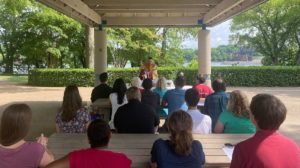
Father Christopher Floersh leads an outdoor Mass for young adults at Tennessee Riverpark in Chattanooga.
“I think the other thing is really being intentional in inviting the young adult community to share their gifts….It’s really important with the young adult community that they are invited into leadership, into participation, that they are given meaningful ways to give their gifts in service to the Church.”
Grace Pakeltis moved to Knoxville from Illinois to attend graduate school. She wanted to plug into a community of people who shared her faith and would support her during her time in Knoxville. For many young adults like Dr. Pakeltis, it can be intimidating to attend Mass alone in a new city where you don’t know anyone, much less show up to an event or Bible study.
“It’s very intimidating at first, but the connections you can make are so worth it,” she said. She began attending Sacred Heart for Mass as well as the parish’s young adult women’s Bible study. As the YAI progressed, she found more opportunities in the parish, attending both young adult and larger parish events, as well as ushering at Mass.
To her, the key to a strong young adult community is relationships rooted in Christ.
“A young adult community is a great place to share my faith and the other parts of my life,” she said. “Through Bible studies and casual meet-ups, authentic friendships can be made, which make life so much more joyful.”
The Sacred Heart YAI core team wanted to reach more young adults, but its aim was more than simply bringing in more numbers to parish rolls. Team members wanted each person touched by the project to make an authentic connection—to Christ and to others. They wanted young adults to discover how the Church makes life more joyful.
Challenged to take risks
In January 2019, parishes began to receive funding from the YAI. This quarterly grant allowed parishes to focus on innovation rather than cost when it came to young adult ministry. Participating parishes were encouraged to take risks and try new ways of engaging with young adults, especially those away from the parish campus who may not even enter a church regularly and need to be welcomed and invited elsewhere first.
Sacred Heart Cathedral already had established young adult men’s and women’s Bible studies. The YAI core team relied on those small groups to serve as a place of welcome for new young adults in the parish. If someone new came to an event or Mass, there was a weekly group to invite him or her to join in, saying, “There’s a place for you here.”
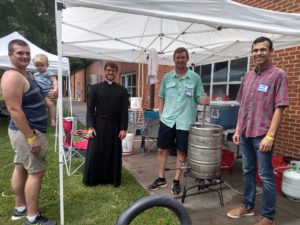
Father Michael Hendershott, associate pastor of Holy Ghost Parish, is joined by Kevin Blatchford, holding daughter Bernadette, Will Tullock, and Juan David Barajas at the “Saints and Suds” cookout at Sacred Heart.
The core team also sought ways to attract people to the cathedral campus who may not be attending church or those who were coming to Sunday Mass but not otherwise involved in the parish.
One such event was “Saints and Suds,” a homebrewing event and cookout held in July 2019. A local beer-brewing club brought its equipment to the pavilion of the cathedral and set up a demonstration of how to start the beer-brewing process. There was also a picnic and casual social time. A follow-up event a few weeks later, “Dominicans on Draft,” invited everyone back to tap the kegs and taste the homemade beer. Dominican Sisters from the Congregation of St. Cecilia, who teach at St. Mary School in Oak Ridge, spoke on virtue and answered questions about the religious life.
The YAI core team also hosted “Adoration and Abridged” regularly, where the young-adult community would attend the parish’s adoration and confession hours on Wednesdays then go out for dinner and drinks. The goal was to mix a parish-wide activity with young-adult time, as well as include both spiritual and social elements.
“The Young Adult Initiative helped me to really tune into the parish,” said Dr. Pakeltis. “It made Sacred Heart really feel like home as I grew to know more of the people in the parish. My favorite event was easily ‘Adoration and Abridged.’ Starting the evening worshiping Jesus and followed by fellowship was so beautiful. It was something I always looked forward to. Weekly Bible study was also an amazing experience. It was a place where I was able to dive deeper in my faith alongside other amazing women.”
The young-adult community at Sacred Heart also held holiday celebrations, online reflections, wine tastings, Bingo and trivia nights, and one-day spiritual retreats.
As these activities were taking place in Knoxville, members of the YAI core team continued to attend YAI gatherings at St. Meinrad for resources and networking. Parishes had the opportunity to share ideas and brainstorm with other participating parishes and learn from their successes and failures.
“It saved us a lot of heartache and pain and failure to learn both from others’ mistakes and successes,” said Rick Grinstead, director of youth and young adult ministry at Sacred Heart. “I love the success stories. I tend to be a positive person; I just gravitate toward the positive. But what I found comforting were all the failures that happened. Is that bad? But what it said to me is: number one, people are trying. Because they’re failing, it means they’re trying. But also, number two, sometimes when maybe our things don’t pan out, we’re not the only ones failing. It’s the encouragement of ‘keep going.’”
Another part of the gatherings was having national experts come in and share their knowledge in understanding and engaging young adults. Parishes would then be challenged on how that could be implemented in their ideas or how that would look in their parish. Speakers addressed topics such as hospitality, the domestic Church, and younger generations’ attitudes about identity, authenticity, and institutions.
Finally, the parishes would pray together and for one another. When at St. Meinrad, they would attend Mass together.
“I think that was a key part to the success of the program, how we prayed together as a Young Adult Initiative community,” Mr. Horace said.
The ‘young adult ministry death spiral’
Parishes involved in the YAI were urban, rural, large, and small. Each had its own unique circumstances. Yet many faced similar problems: finding volunteers, finding space for another ministry, or getting young adults to even come to church, much less get truly involved.
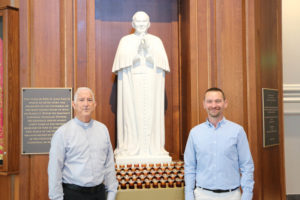
Deacon Walt Otey and Rick Grinstead collaborated with the St. Meinrad Young Adult Initiative to engage and encourage young adult parishioners at the Cathedral of the Most Sacred Heart of Jesus.
One of the biggest challenges that almost every parish faced was transitions. Young adults are often in a state of transition. College or graduate school, a new job or transfer, or marriage or a growing family can often lead to young adults moving somewhere for a year or two and then moving on. A young adult group rarely has the same group of people for many years, making long-lasting friendships and stable leadership difficult.
On top of that, there are transitions within the parish staff: a new pastor assignment or a new director of religious education or young adult coordinator. Mr. Wells, who as DRE helped Father Boettner get Sacred Heart involved in the YAI, stepped down in 2018. That year, Rachel Meixner joined the parish staff as director of youth and young adult ministry and served as the new YAI coordinator until she moved in 2019. Deacon Walt Otey took over as YAI coordinator for several months until Mr. Grinstead joined in 2020.
Each passionately worked to help make the YAI a success at Sacred Heart, but each transition meant a stop and start on some ideas, shelving other ideas, and a period of lost momentum. Mr. Horace said each participating parish had some amount of pastoral, staff, or core team transitions.
How does a parish establish a stable, sustaining ministry through change?
“That is the dilemma of transitions,” Mr. Horace said. “And what we’ve learned, and something we’ve known already, is when there is a person in charge, when there is an instigator and they get things going and then they move on—especially if they’re a young adult it’s expected of them to move on at some point—things have been collapsing,” Mr. Horace explained.
“There’s a saying these days about the ‘young adult ministry death spiral,’ where a group of young adults will go to the pastor and say, ‘Father, we’d like to get something started,’ and he’ll say, ‘Great, go for it.’ They will, and they’ll do some great stuff. And then whoever’s the leader, the protagonist, will have a life change; they’ll get transferred or they’ll have a baby or whatever, and everything falls apart. Until later on, some more young adults come up and say, ‘Father, we’d like to get something started.’
“And we just see this cycle over and over again, and what we as a Church need to figure out is how can we make the efforts sustainable despite the inevitable leadership changes. As with many parishes we had, there were starts and stops and reboots, and it took time to get things rolling,” he added.
To him, these transitions weren’t a setback to the YAI. It was a challenge that parishes needed to learn to anticipate and seek solutions to. If change is inevitable, then the Church needs to be ready to respond to change. He said that he thought Sacred Heart handled each transition well, as evidenced by the continuation of the small groups and the growing engagement of young adults at the parish.
“To me, the cathedral is really rolling right now. Without a doubt, Rick is a big part of that in his leadership and his reimagining of how the Young Adult Initiative should be at the cathedral parish. I just think that the core team has done a really good job in sustaining things throughout those changes, and it’s really exciting where they’re at now with different activities.… All of those things are things that will sustain and last for a while,” Mr. Horace said.
Plugging away through a pandemic
Mr. Grinstead joined the cathedral staff in March 2020, just as a different type of transition was about to affect not just the parish, but the whole world.
“When I came, it was two weeks later that everything shut down. And that doesn’t give you a lot of time to meet people in person,” he said.
The uncertainty of COVID-19 at the time led to massive shutdowns. Even public Mass was suspended for several weeks in the diocese. Everyone had to figure out how to connect without being in person. The March 2020 YAI gathering was held over Zoom, and many wondered how their efforts could survive such a halt to regular activities.
Mr. Horace said the pandemic had a major impact on the YAI. It hit right in the middle of the period of funding where parishes were being encouraged to go out and do things, but suddenly everyone had to stay home.
“It did force us to reimagine: ‘How can we work with young adults, or any parishioner, in this type of situation?’” he said.
Despite the devastating tragedy of the disease, he did see it as a blessing that the pandemic happened at a time when there were technological means for people to still connect online.
“What a blessing between social media, online platforms, and Zoom and all that. It was different; it wasn’t nearly as good as in person, but we were able to do a lot during the pandemic, and I think we learned how to do a lot. And I think as we move out of the pandemic, those tools are going to stay with us,” he said.
Father Boettner said the YAI helped the parish attract a new director for young adult ministry, and that Mr. Grinstead had the energy and passion to jump right in, even amid chaos.
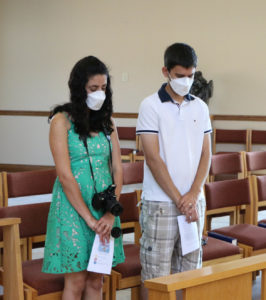
Young adults worship at St. Albert the Great Church in Knoxville during a special young adult Mass celebrated by Bishop Richard F. Stika on Aug. 28. The Mass and a social event afterward brought together young people in the diocese who the Church in East Tennessee is reaching out to for their faith-filled inspiration. Young adult programs in parishes around the world are considered vital to the future of the Church.
For Mr. Grinstead, he had barely had time to meet any Sacred Heart parishioners before everything shut down, so he started a weekly Zoom gathering for young adults to meet each other and stay connected. He credited the existing community of young adults already at Sacred Heart with the success of an online community.
“To have a group of people who were already—they weren’t just journeying together through some Scripture, which is wonderful, but they were journeying together through life. I got to know more and more of the young adults, seeing some of them start to get married, some of them are having children, some of them are starting new jobs or new areas of schooling. Everybody was in it with each other. There seemed to be this familial feel to the group that I could just jump in and be a part of,” he said.
“So when everything went online, I didn’t have to try to get people who had never done anything here to try to do something online, which we all know how not many people like to do that. It was encouraging. They didn’t care how it was happening; they just cared that it was happening,” he added.
The YAI core team also sought to offer young adults a spiritual resource to help them as Mass was suspended. YAI funds made it possible to mail out the book “Saint John Paul the Great: His Five Loves” by Jason Evert to any young adult who requested it, parishioner or not, with the hope that reading about St. John Paul II’s struggles and faith would provide spiritual nourishment during an uncertain time.
Core team members also hand-wrote cards to include in each book, personalizing it and letting the recipients know that members of the parish were praying for them.
“I’m going to be honest, I was sweating it out a bit thinking, ‘I’m going to be stuck with 50 books, and five people are going to ask for them, and I’ll have spent X amount on these,’” Mr. Grinstead said. “But what we found was people actually wanted it. And people appreciated the personal card we put inside. We took an idea that seemed on its surface a good idea and made it a great idea. Which, when you’re able to kind of put finances behind it, you can fine tune and even go deeper with your initial idea. When we had people sign up for it, like ‘who wants one?’ The amount of people signing up was blowing my mind.”
Mr. Horace said the YAI parishes had to adapt and find ways to connect during the pandemic, but it also helped to spark innovation and creative methods, which was a big component of the initiative.
“I think another blessing of that time is that we tended to fall upon events as the focus of everything we did with ministry with young adults. It all had to be a gathered event, everything. And the pandemic forced us to explore new ways of engaging young adults that did not involve a gathered activity. I think there were a whole lot more phone calls, a whole lot more one-on-one conversations. We found new ways to minister to young adults that I think we needed. We still need events, and that’s a very important piece, but we need to be thinking way beyond just events for how we minister with young adults,” he said.
Forming engaged parishioners and leaders
Over the past several months, Sacred Heart has continued to develop new ways of reaching young adults. Mr. Grinstead and young adult parishioner Holly Mostyn host a weekly podcast, “Happy Hour,” exploring topics of faith and challenges of young adults. The parish hosted an Alpha program for young adults, attracting several new faces to the parish. Alpha builds on the most fundamental questions about faith and facilitates discussions for participants to explore their beliefs.
Father Boettner said that his hope for Sacred Heart being a part of the YAI was that the young adult community would feel welcome at the parish and be empowered to take ownership of young adult ministry.
“In young adults you’re really hoping to see some peer ministry and peer outreach. And I think we’ve seen that. I think we’ve got just a really dynamic group of young adults that is making the cathedral home. And they’re really good about reaching out to others,” he said.
The cathedral rector said he’s noticed a difference in the number of young adults attending Mass at the cathedral as well as those getting involved in parish ministries.
“More and more of our lectors, ushers, and extraordinary ministers of Communion and musicians reflect our young adult population. I’ve noticed that our Sunday Masses have a lot more young adults and young families present,” he said. “And then with leadership, I’ve seen our young adults stepping forward, both with our women’s guilds and with our men’s groups. So, I don’t think our young adult community is a consumer community. I think they’re actively engaged. I think they must have received the signal that they were not only wanted here but needed. I believe that our community is more vibrant and healthier because of the presence of our young adult community.
“That’s a real positive thing, when you see other people stepping forward and saying, ‘I have gifts that I can share.’ I think you’re going to see a vibrancy that continues on after this project with St. Meinrad. But I think the project gave us that momentum we needed to really get moving in the right direction.”
As the five-year period of the program comes to a close, Mr. Horace hopes the conclusions from the St. Meinrad YAI help not only the participating parishes but also all parishes seeking to better involve young adults in the Catholic faith and in parish life.
“We offered a lot of resources. We offered some framework, but the parishes figured out on their own what’s their best way to engage their young adults,” Mr. Horace said. “I’d love to see that duplicated in dioceses so there’s more focus and more attention spent in coaching and cheerleading parishes to be engaging their young adults more effectively. Every parish wants to do better engagement with their young adults, and I think it’s very possible.”
“I don’t think much about what we’ve learned is groundbreaking as much as it hammers home issues and challenges we have in the American Catholic Church,” he said.
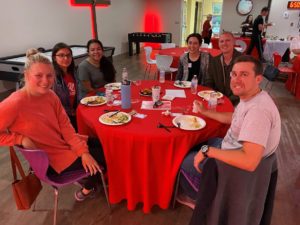
Young adults share dinner and faith discussions during the Alpha series for young adults at Sacred Heart.
He explained that most young adult ministry is event-based and focuses on creating a young adult group. And while a peer community is an important component, another component of ministering to young adults is integrating them into the larger parish community.
“The older model is very much a silo model; it’s young adults doing peer-to-peer stuff. And again, that’s needed; that’s a part of it. But that can’t be the whole thing. We need to help the parishes to welcome and engage young adults and get young adults involved in the parish, not just their own little silo group that does their own little thing.
“We’re finding how important that is, and I think many parishes involved in the Young Adult Initiative have significantly shifted from just young adults doing their own thing to young adults being much more woven into the fabric of the parish, and that’s a very, very good thing. That’s a good thing for the parish to have its young adults involved throughout the parish, and it’s a good thing for the young adults to be involved and engaged in their parish community rather than just some peers.”
He said that while the funding from the Lilly Endowment was helpful, money doesn’t automatically lead to more engagement. Parishes can network and collaborate with one another to help brainstorm ideas. Individuals can invest in developing personal relationships and inviting others to church. The most important thing is to have the desire to reach out to young adults, listen to their needs, and accompany them on their faith journey, which is how they should minister to anyone, regardless of age.
Mr. Grinstead agrees. As he prepares for the conclusion of the YAI and the end of its funding, he is optimistic that the young adult ministry at Sacred Heart will not only survive but flourish.
“There is a reality when you don’t have all the resources there that you did before. And the reality is you aren’t going to be able to do everything on the same level,” he said. “But at the same time, because we were able to pour into a great foundation, you don’t have to re-establish the foundation. You don’t have to spend as many resources to continue the ministry. It’s a funny thing; I find that when people’s backs are against the wall, if they value what they’re doing, they will go well above and beyond what they normally would. If people want it, they will make it happen and come together as a group to do it.”
And in the end, that was the goal of the initiative, to have young adults not just be served by a parish but to be fully engaged members of the parish, willing to actively take part in ministry and live a life dedicated to Christ.
“The ultimate goal is that we have a parish,” Mr. Grinstead said. “No matter the age. Now, to meet the specific needs and the reality of those needs is important. A 25-year-old single person who just moved here might find it difficult to be a part of some of the groups that we have at the parish, so we need to meet those individuals needs in order to meet the needs of the parish as a whole. But the ultimate goal is plugging young adults into the parish as a whole.”
Today’s culture makes it easy to become isolated. Family bonds are weaker. Transitions are more common. Divisions in the country have made people suspicious and bitter. Young adults in particular feel the isolation and disruption of the times. They long for an identity and authentic friendships and a community where they belong. But they don’t always know how to find it.
The days where people attend church out of cultural habit are past. Young adults choose to engage with their local parish community, or not. A parish cannot wait for the next generation to walk in its doors; it must go out and preach the Gospel. Every Christian must be intentional in developing personal relationships, showing them that the Church has a place for them because Christ has a place for them. An authentic faith in Christ provides identity, and a vibrant parish community provides friendship and belonging. The YAI shows creating that type of community in every parish is difficult but necessary work. And the fruits of the next generation finding Christ and finding a home are worth every effort.
To parishes worried about the decline of young people present, Mr. Grinstead has some advice: take courage.
“The one thing [the YAI] taught us is to have courage, to do something. Don’t make the excuse that you don’t have resources, because the reality is it’s relational, and anybody can build relationships. It costs nothing except your time,” he said. “I would just encourage people to look for ways to personally reach out to young adults. Make it personal. Begin there. That’s where it starts. Build something small. Don’t try to build something gigantic. Pour yourself into a small group. It’s the model of Christ; He did it that way for a reason. Be excited. Be ready. Where the Lord calls you, go.”

